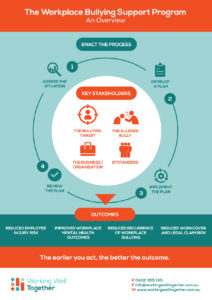The impacts of workplace bullying are multiple and complex. They include both physical and mental health consequences from stress related physical conditions to trauma and suicide. An essential to ensure survival and recovery a target needs to be supported.
However, in working with employees in a support capacity, I have come to understand another essential is required for workplace bullying support. This is empathetic leadership.
Empathetic leadership is required for bullying claims, not just proven bullying
I am going to challenge some thinking when it comes to bullying support. I don’t believe bullying support should be provided to proven bullying cases only. I believe it needs to be extended to workplace bullying claims as well and here is why.
Human beings are complex and bring with them their past as well as their present when they come to work. While some of the individuals I work with are suffering under behaviours presently in their workplace, others are suffering from both past and present.
Let’s look at a couple of examples.
I was asked to provide workplace bullying support to Bill by his manager, David. Bill was being targeted by one of the other managers in the organisation, John. David asked me to work with Bill because he knew that Bill had been bullied in a previous workplace and was still struggling (and suffering) because of that previous experience. Bill and I worked together to identify strategies that would help him cope through his current situation. We developed strategies that empowered him in his engagements with John, while the organisation worked on overall solutions to the bullying behaviour.
David had empathy for Bill’s previous and current experience. This allowed Bill to find solutions and develop new skills in the process.
In a second case, I was invited to work with Paula, who was claiming that her employer and boss, Susan, was bullying her. I completed an assessment and I came to the conclusion that Susan wasn’t bullying Paula. However, it was obvious that Susan was triggering Paula’s anxiety. Paula’s responses and behaviours, in itself, was overwhelming for Susan and other workplace colleagues.
What I came to learn was that Paula’s responses, and claims of bullying, were triggered by past trauma. In conversation, she struggled to separate Susan from past perpetrators of trauma creating behaviours. This workplace situation was never going to be resolved without appropriate psychological professional help. My role was to gently guide her towards that help, which eventually she accepted.
Without a doubt, Susan was frustrated and at a loss about how to resolve the whole situation. In this situation, very few employers are equipped to resolve a situation with such complex support needs. However, it was her empathy, knowing that Paula had significant health issues as well, that led to the working partnership between Paula, myself and the company.
Empathy leads to solutions
In both of these scenarios, David and Susan had an essential characteristic, empathy. It was this empathy that allowed them to consider workplace solutions that aim to empower both Bill and Paula. Many employees who are, or believe they are bullied, or feel disempowered. The support provided them with an opportunity to regain some level of control.
It was empathetic leadership that lead to those solutions.
You may be curious as to why an employer should provide support, especially in the case of Paula which in my assessment was not bullying?
Maintaining a safe workplace, including psychological, is legislated. In the latter case, the employer had to do something. The situation in the workplace was creating significant anxiety and was a workplace health and safety risk for other employees. There is an obligation to act.
However, the pathway taken by both employers was one of values. It was important to them to provide support to their employees at times when they were struggling.
This helps build a positive relationship between an employer and their team. It means they feel valued. It wouldn’t have happened without empathetic leadership.
Learn more about our Workplace Bullying Support Program
Contact us today for a confidential discussion on how we can help you support you and your employees with bullying claims.


